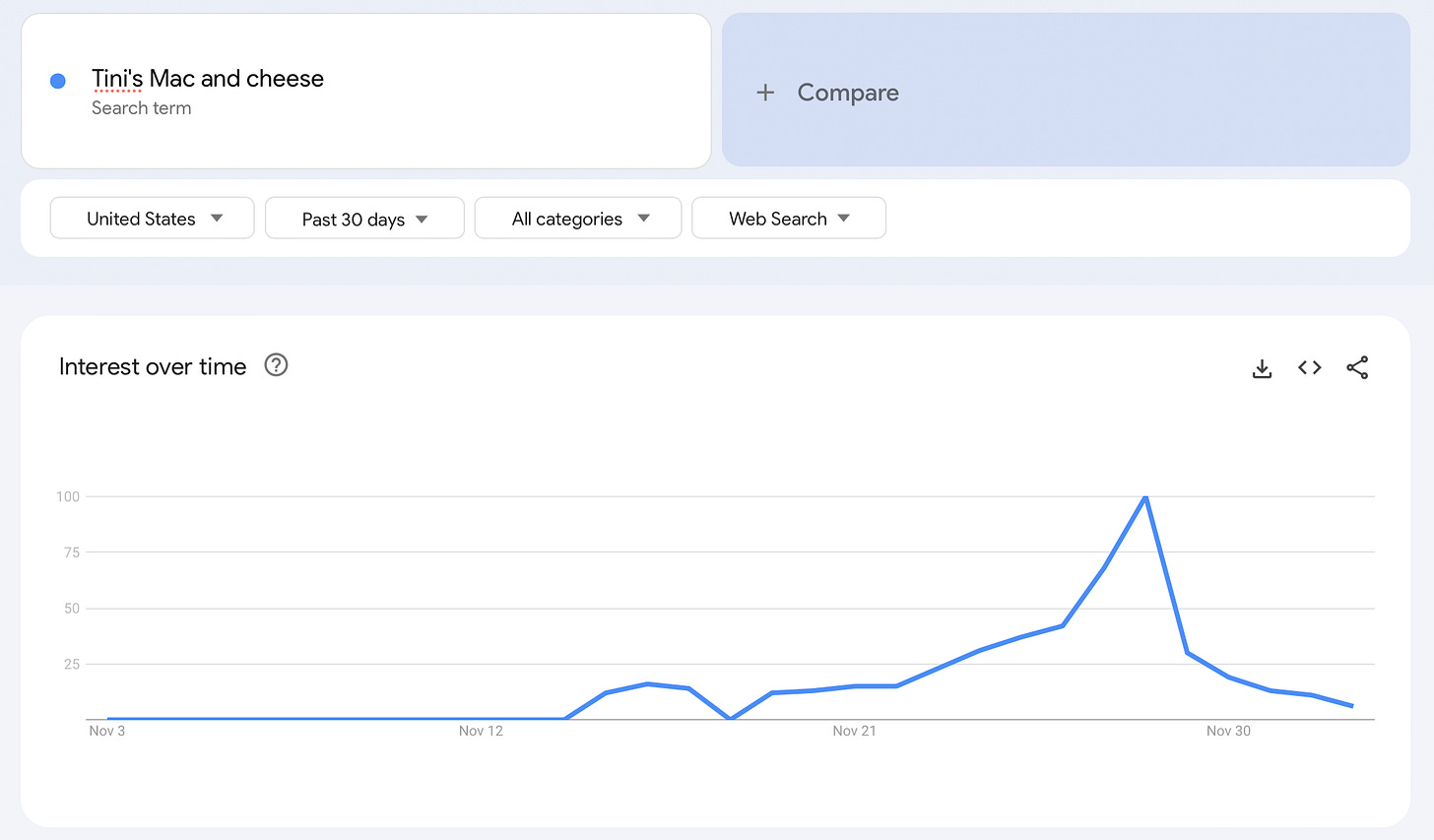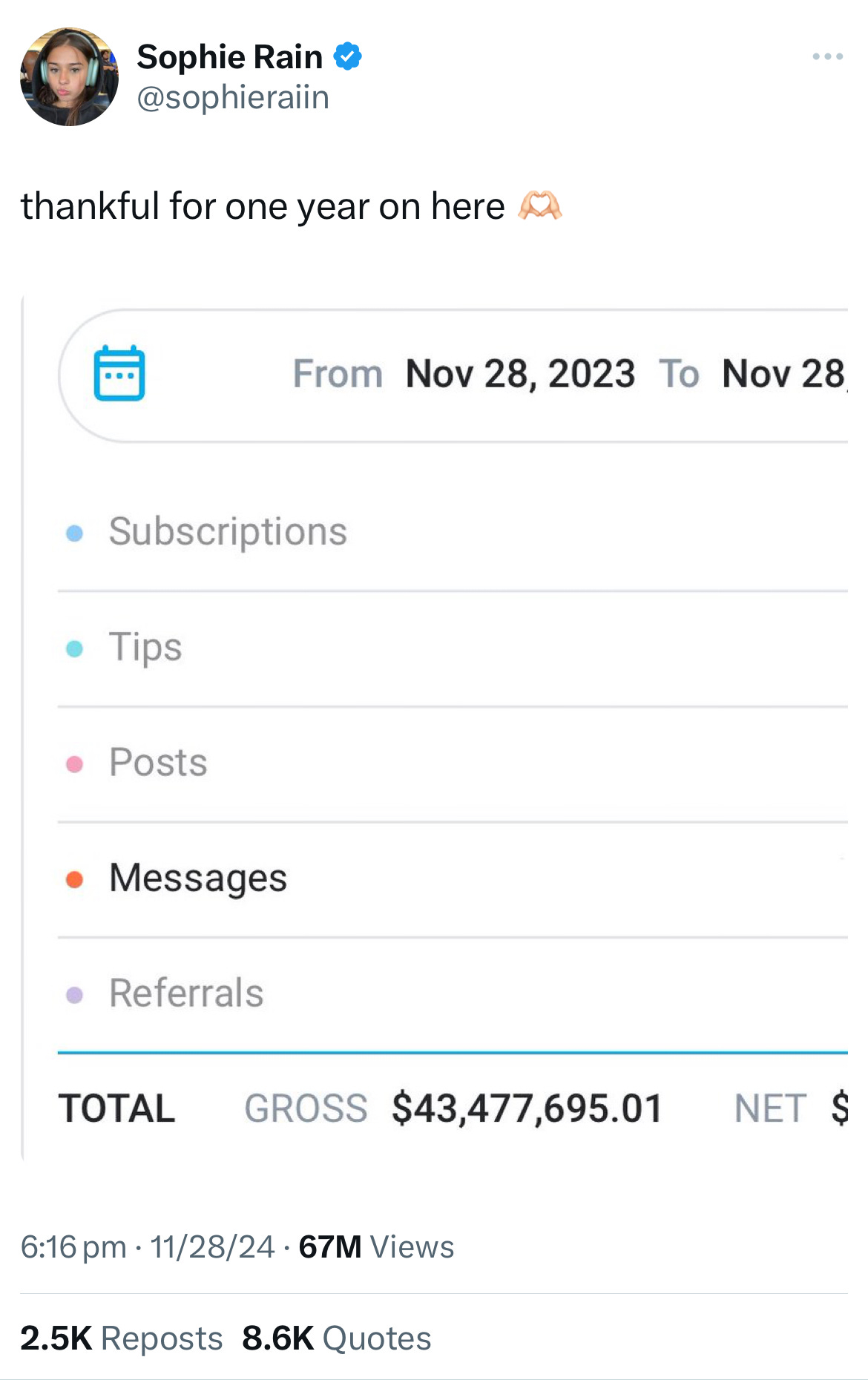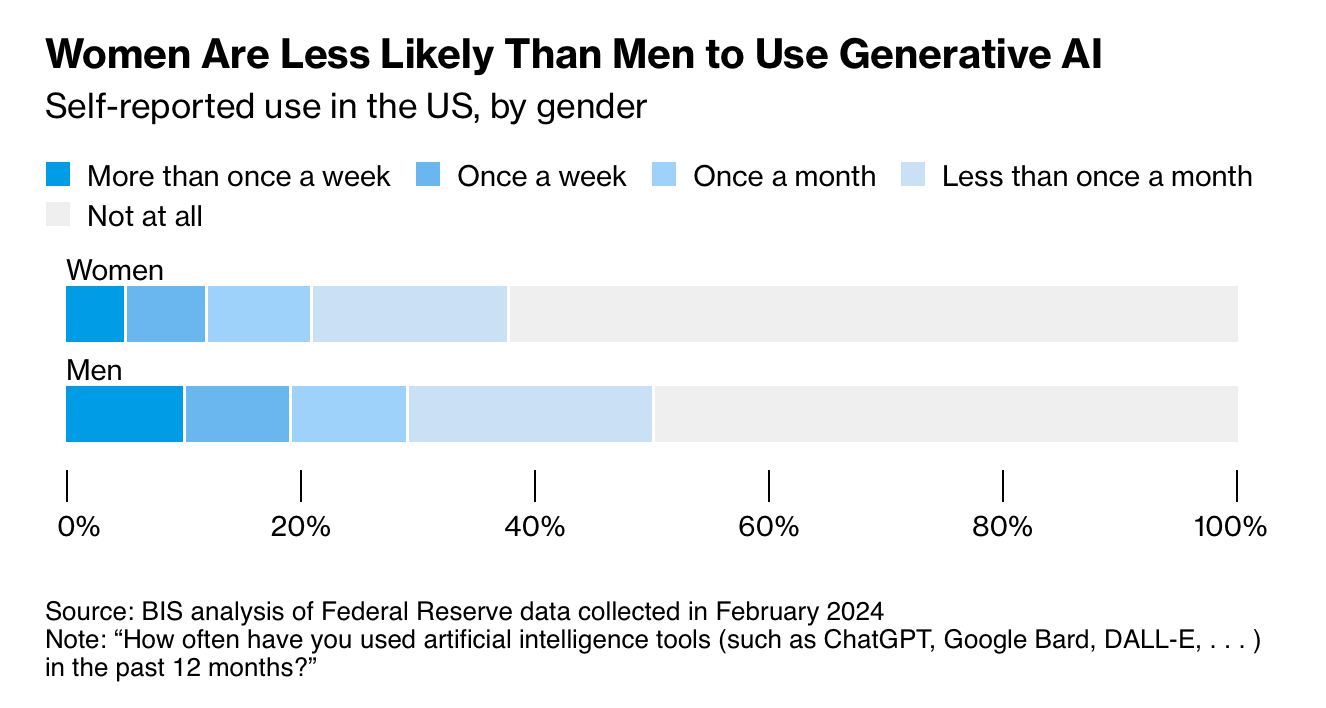The gender chasm in the online lives of Gen Z
PLUS: Ignoring celebrities, Tini's mac and cheese, Apple Martin and Jacob Elordi's beard
A juicy insight-packed survey hates to see me coming. And the latest data set to grab my attention is Ofcom’s Online Nation 2024. Their annual deep dive into what people are doing online in the U.K. always throws up gems, but this year the findings tell a distinct story - Gen Z men and women live very different online lives.
The gaps fall into three areas, use of AI, platform engagement and exposure to harmful content. And the differences are so stark they could shape how young men and women view the world and what their futures look like. I dig into the findings at the end of this edition for my wonderful paid subscribers. Before I do that let’s take a look at what’s been catching fire this week…
Trends, trends and even more trends
Ignoring celebrities… is blowing up on TikTok after Anita Brand posted a viral video suggesting that it would be “hilarious” if big stars “posted and got only 13 likes”. Her pitch struck a chord and got more than 10 million likes and over 50 million views.
The first victim of the boycott was Dance Moms-star-turned-singer JoJo Siwa whose posts have been flooded with comments referring to Brand’s idea. One video posted by Siwa on Monday has just 38,000 likes while the most popular comment on it, which reads “GUYS STICK TO THE PLAN”, has had more than 300,000 suggesting that many viewers are following the ignore celebrities idea. Other commenters have declared that Siwa “was a perfect test subject” and that “it’s working”.
The mission to ignore celebrities comes hot on the heels of the urges to boycott Resilient Jenkins, the pregnant mom who went viral on TikTok after she revealed that her four children didn’t have beds. Her critics urged viewers to not watch her content so that she didn’t benefit from TikTok’s creator fund, which pays based on views. Despite lacking a specific motivation other than it being “hilarious” the ignore celebrities movement has echoes to the Resilient Jenkins protest, with one commenter declaring: “We just dont realise that it actually us who have power. Like we literally decide their salary.” Watch out celebs!
Zebra striping… is the new way to survive alcohol-heavy events over the holidays according to young drinkers. More than three quarters of 18 to 24-year-olds in the U.K. say that they alternate between alcoholic and non-alcoholic drinks when socialising. The hack saves money and spares hangovers according to one zebra striper.
We listen and we don’t judge… is a catchphrase and format blowing up on TikTok that has people confessing their toxic habits to partners, family members and friends. One of the most watched is from Janie Ippolito who confesses to her husband that she sometimes “doesn’t have a headache”, that she secretly goes for botox and hides his keys to annoy him. He admits to lying about work he needs to do around the house so he can play video games and that he retreats to the bathroom when their home gets too chaotic. Their video has been watched more than 37 million times.
The we listen and we don’t judge concept has since spread to Twitter/X, Threads and Instagram. As far as I can tell a big brand hasn’t jumped on the trend and ruined it… yet!
Going viral
Tini’s mac and cheese… Regular readers will remember that last month the social media chef’s wedding blew up on TikTok and then last week she went viral once again because of her legendary mac and cheese recipe.
Tini’s method for the Thanksgiving dish was so popular there were shortages of the corkscrew-shaped cavatappi pasta she recommends, a spike in Google search results for her recipe, massive debates about the role of breadcrumbs and across the two TikTok videos, where she details her non-breadcrumb method, over 210 million views.
TikTok food critic Keith Lee said he went to six stores and couldn’t get any corkscrew-shaped pasta but even without it he declared that his attempt at Tini’s recipe was the best mac and cheese he’d ever made. That video has had more than than 11 million views. Other creators like Esther Lee and Caroline Hadley also raved about their results and got 40 million and 12 million views respectively.
There isn’t a way to calculate the total views Tini’s mac and cheese got across all the creators on TikTok but I’m going to say it’s the app’s most viral dish to date. However trends move fast and TikTok has already moved on to a new viral recipe known as Mama’s Turkish pasta. It does look delish.
Sophie Rain… after she claimed that she made $43 million in a year on OnlyFans. The model posted a screenshot from the platform to Twitter which purported to show the earnings she made from selling NSFW content of herself in the last 12 months. She followed up by revealing that one subscriber called “Charley” was responsible for over $4 million of that total alone.
Rain, from Florida, set off heated debates about whether she really was making that much money, the morality of OnlyFans and concern that she was a top performer on the platform only because she looks much younger than 20 years old.
Creator Tinx hit the nail on the head with her thesis that we shouldn’t be that shocked that she’s making bank because “men like to look that much”.
Jacob Elordi’s beard… was a whole news cycle. And the overwhelming consensus is that the Euphoria and Saltburn actor should have kept a razor in his routine.
So hot right now
Apple Martin… after she was ‘presented to society’ at the Le Bal des Débutantes in Paris. The genetically-blessed daughter of Gwyneth Paltrow and Chris Martin has been known to nepo baby watchers since she was born but her appearance at the archaic high society event was her first major moment in public and boy did she create a splash.
She attended the uber-posh event on the arm of the insanely-named Count Leo Henckel von Donnersmarck and was accused of rolling her eyes at him and stealing the spotlight from another attendee. Having watched both videos it seems like viewers are reaching for a story, which gives her a taste of the kind of scrutiny she can expect as she steps into the spotlight. I wish her well, to steal a phrase from her mom.
✨Callback corner✨
Kai Cenat finished his 30-day live streaming marathon over the weekend and now has over 700,000 subscribers making him the most subscribed to Twitch channel and a very rich man.
Pro golfer Bryson DeChambeau finally nailed the hole-in-one over his house after 16 days and 134 attempts. He racked up over 189 million cumulative views for his challenge across Instagram and TikTok. A major achievement in his second career as a social media creator.
The remarkably different online lives of young men and women
The new report from Ofcom lays out a fascinating picture of the gender gap between Gen Zers that could have significant ramifications for how they see and experience the world. Here are my takeaways…
1. Young men use AI significantly more than young women
Male internet users in the U.K. who are aged 16 to 24 use generative AI 28 per cent more than females the same age. Young men are the biggest users of AI overall with 87 per cent reporting that they’d used the technology in the past year. Meanwhile just 68 per cent of young women said the same.
The AI gender gap is clear across all over 16s surveyed, with only a third of U.K. online females reporting that they’d used generative AI compared with half of males. That gulf is backed up by research from the Federal Reserve in the U.S. which shows that men self-report using generative AI way more than women.
The gender gap matters because as AI disrupts or replaces jobs understanding how to use the technology will be essential. Women could be further disadvantaged in the employment market and the pay gap could exacerbate if they are less experienced with the technology. Differing usage levels can also impact each group’s information environment and make the issue of filter bubbles and echo chambers much worse.
SIDE NOTES:
Sixty-three per cent of online children, aged between eight and 15, have used AI in the past year for “fun” and over half have used it for school work.
The same group reported that they’re most likely to use AI to find information and the second most popular reason, cited by 30 per cent, was to create images.
ChatGPT was the most popular AI platform for U.K. internet users over 16, with over four million Brits engaging with it in July this year.
2. Young women spend 60 per cent more time on TikTok than young men
Keep reading with a 7-day free trial
Subscribe to highly flammable by Rachel Richardson to keep reading this post and get 7 days of free access to the full post archives.













